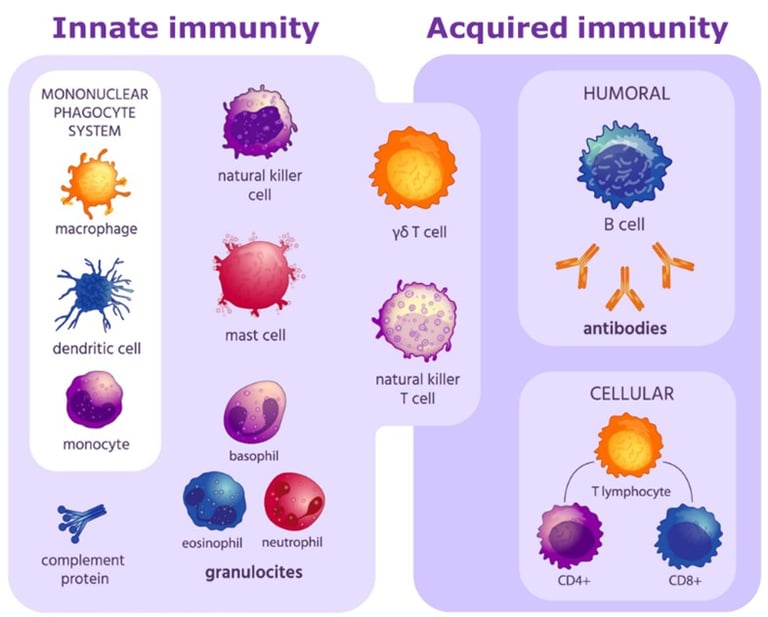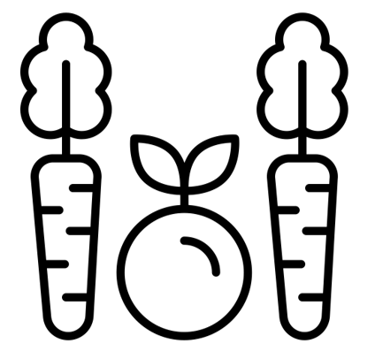Immunity and diet: what links?


As with other aspects of our organism's functioning, there are many links between them
Our immune system is essentially a system for detecting and destroying foreign bodies and is also involved in the ongoing elimination of cancer cells. It rests on three pillars, the first of which is made up of all our body's bulwarks against foreign bodies: skin, tears, saliva, respiratory tract cilia, gastric acidity, etc. The second pillar is innate immunity, and the third is acquired immunity.
Innate immunity is based mainly on our leukocytes, our white blood cells, which are produced in our bone marrow and circulate in our blood. It's important to note that these white blood cells need proteins to make them, and that three-quarters of our proteins are found in our muscles. In other words, we need to maintain our muscle mass, our protein reserve, to support our immune defenses. Acquired immunity is based mainly on our lymphocytes; there are different types of lymphocytes, with different roles:
Tartila/stock.adobe.com
The main links between our immune system and our diet are as follows:
1. Both the production of our white blood cells and lymphocytes is supported by nutrients. These include prebiotics, vitamins A, B6, B9, C, D and E, zinc, iron, copper, selenium, manganese, magnesium, coQ10, polyunsaturated fatty acids, the amino acids cysteine, arginine and glutamine, and glutathione.
Vitamin C, in particular, has the effect of increasing interferons, proteins that produce cytokines that increase resistance to viruses. It also increases the mobility of white blood cells and stimulates the production of certain lymphocytes. Finally, it accelerates the breakdown of histamine, which weakens immunity to infections of the nose, throat and ears.
Zinc, in particular, stimulates the production of cytokines and thymulin, which activates the thymus to produce lymphocytes. It is also involved in the synthesis of an important antioxidant enzyme, since oxidative stress depresses immunity.
2. When the immune system is called upon, it consumes energy. Ideally, this means higher intakes of carbohydrates and fatty acids, as well as magnesium, zinc and B vitamins for energy production.
3. The immune response to an infection can be intensified or reduced by certain nutrients. Nutrients that intensify the immune response include most omega 6 fatty acids and garlic allicin. Those that reduce it include, among others, omega 3 fatty acids. In the case of covid-19, for example, it's an excessive response in the form of a "cytokine storm" that's particularly problematic.
4. In the event of infection, the liver retains more iron and zinc from the diet, which would otherwise help bacteria to proliferate. Conversely, it releases more copper, as it oxidizes the bacteria. Zinc (or iron) supplementation should therefore be discontinued during an infection and can be resumed once the infection has healed.
5. In the event of a major viral infection such as the flu, the body draws on its reserves of glutamine, an amino acid stored in the muscles, to synthesize immune system cells. This can lead to a relatively significant loss of muscle mass. To avoid this, it may be useful to increase glutamine intake or supplement with 3 to 5 g per day for the duration of the infection.
6. Many of our lymphocytes are found in our intestines, more specifically in intestinal mucus and in Peyer's patches, a cluster of lymphatic tissue lining the last part of the small intestine. It is therefore important to maintain good intestinal health, notably by consuming pre and probiotics and limiting inflammatory foods (i.e., those rich in saturated fats, fast sugars, salt, gluten and/or toxins, alcohol, and fructose). Poor intestinal health can lead to dysbiosis or intestinal hyperpermeability, and even have an impact on the brain.
7. Immunodeficiency, i.e., a marked and lasting reduction in immunity, can have several causes, including a lack of the nutrients required for its proper functioning. In addition to the case of undernourished people such as the elderly, this lack of nutrients can be the consequence of a restrictive diet, taking medication, smoking, pollution, cancer treatments or chronic stress that over-consume nutrients, digestive pathologies, or excessive sport without sufficient compensation. Another cause of reduced immunity is a bad diet, particularly excess saturated and trans fats, excess iron, excess fast sugars, inflammatory foods, and so on.
To find out more, also read these articles:
On intestinal microbiota: https://isabellemaesnutrition.com/en/microbiota
Woman with a cold picture by Spencer Backman


